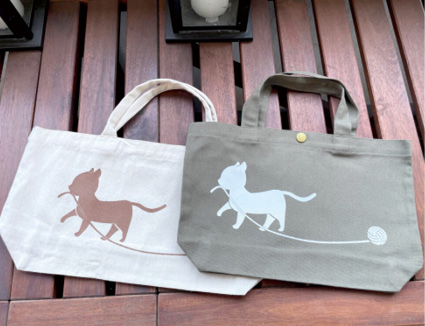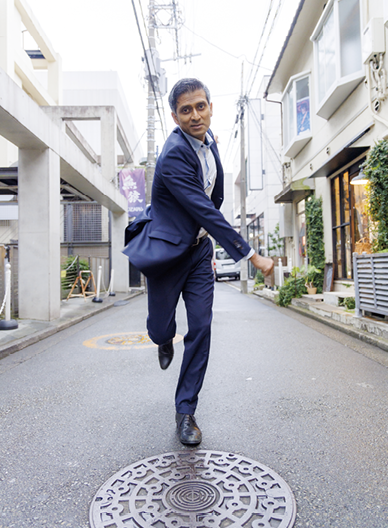Produce novelty goods made of leather and fiber in Bangladesh for sale in Japan.
M & P Japan K. K.
Mr. Fayez Ahmed

What kind of business are you engaged in?
We receive orders for leather products such as bags and pouches, as well as fiber products such as T-shirts and eco-bags from our Japanese customers, and produce and sell them at contracted factories in Bangladesh. Our main products are novelty goods. Novelty goods with corporate logos have a wide range of uses as sales promotions. We have responded to orders from general companies such as financial institutions and manufacturers, as well as chain ramen shops. We communicate closely with our local partners to ensure that we produce products that meet our customers’ needs, and we handle everything from production management to import and wholesale distribution.
When did you start thinking about starting a business? When did you start thinking about starting a business?
 Growing up in Bangladesh, which was once considered one of the poorest countries in the world, I was constantly exposed to the humanitarian aid provided by international organizations. As I began working for these organizations, I realized that there were limits to growth through aid and began to consider how business could help develop the country. It was during this time that I had the opportunity to come to Japan. I worked part-time at a restaurant to support myself while learning Japanese and eventually landed a job at a Japanese company. Through this experience, I gained an understanding of the needs of Japanese buyers, which led to the realization of my current business. Bangladesh is the world’s second largest exporter of garments, second only to China. I believed that if I were to start a business, it should be in this industry. It was around this time that I was approached by a Japanese company interested in setting up a production base in Bangladesh. I supported this company by coordinating local logistics and other activities. While working on this project, I never gave up on my own business dreams and continued to explore possibilities. To create products for the Japanese market, it was essential to maintain high quality in addition to cost performance. I searched for reliable partners, suppliers, and factories in Bangladesh, steadily building up a record of achievement and preparing a production management team capable of maintaining Japanese quality standards.
Growing up in Bangladesh, which was once considered one of the poorest countries in the world, I was constantly exposed to the humanitarian aid provided by international organizations. As I began working for these organizations, I realized that there were limits to growth through aid and began to consider how business could help develop the country. It was during this time that I had the opportunity to come to Japan. I worked part-time at a restaurant to support myself while learning Japanese and eventually landed a job at a Japanese company. Through this experience, I gained an understanding of the needs of Japanese buyers, which led to the realization of my current business. Bangladesh is the world’s second largest exporter of garments, second only to China. I believed that if I were to start a business, it should be in this industry. It was around this time that I was approached by a Japanese company interested in setting up a production base in Bangladesh. I supported this company by coordinating local logistics and other activities. While working on this project, I never gave up on my own business dreams and continued to explore possibilities. To create products for the Japanese market, it was essential to maintain high quality in addition to cost performance. I searched for reliable partners, suppliers, and factories in Bangladesh, steadily building up a record of achievement and preparing a production management team capable of maintaining Japanese quality standards.
What was the trigger for starting your own business? Why did you decide to become an entrepreneur?
We specialize in meticulous production management through close communication between our home country of Bangladesh and Japan, where we have been rooted in the region for over 15 years. This enables us to achieve high cost performance and accumulate a track record of virtually zero post-delivery issues, earning the trust of our customers. Specifically, in Bangladesh, we have established a system of checks and rechecks to ensure that no problems are discovered after arrival in Japan, and we thoroughly inspect and measure all products. In fact, I receive reports of factory issues on a daily basis and respond by providing detailed instructions based on the customer’s order. On the other hand, in Japan, we provide total support from product planning to delivery, flexibly responding to each customer’s needs and providing various follow-up until delivery. For example, when we received a request to handle leather products for the first time, we worked together to create multiple samples and successfully completed the productization process.
What was the trigger for starting your own business? Why did you decide to become an entrepreneur?
 We specialize in meticulous production management through close communication between our home country of Bangladesh and Japan, where we have been rooted in the region for over 15 years. This enables us to achieve high cost performance and accumulate a track record of virtually zero post-delivery issues, earning the trust of our customers. Specifically, in Bangladesh, we have established a system of checks and rechecks to ensure that no problems are discovered after arrival in Japan, and we thoroughly inspect and measure all products. In fact, I receive reports of factory issues on a daily basis and respond by providing detailed instructions based on the customer’s order. On the other hand, in Japan, we provide total support from product planning to delivery, flexibly responding to each customer’s needs and providing various follow-up until delivery. For example, when we received a request to handle leather products for the first time, we worked together to create multiple samples and successfully completed the productization process.
We specialize in meticulous production management through close communication between our home country of Bangladesh and Japan, where we have been rooted in the region for over 15 years. This enables us to achieve high cost performance and accumulate a track record of virtually zero post-delivery issues, earning the trust of our customers. Specifically, in Bangladesh, we have established a system of checks and rechecks to ensure that no problems are discovered after arrival in Japan, and we thoroughly inspect and measure all products. In fact, I receive reports of factory issues on a daily basis and respond by providing detailed instructions based on the customer’s order. On the other hand, in Japan, we provide total support from product planning to delivery, flexibly responding to each customer’s needs and providing various follow-up until delivery. For example, when we received a request to handle leather products for the first time, we worked together to create multiple samples and successfully completed the productization process.
What do you feel after starting your own business?
Starting a business does not always guarantee success. I too have overcome many difficult times. Soon after opening a general store in Bangladesh, there was a lockdown due to COVID-19, and some days there were no customers, causing the monthly fixed expenses to continue to pile up. Despite waiting for the situation to improve, the bad situation lasted for a long time, and the store ended up closing. I had dreamed of opening a store, and it felt like a huge failure, leaving me feeling extremely sad and hopeless. However, I now believe that experiencing difficult times and overcoming them leads to the ability to survive and thrive in the future. I think there are many things you cannot know until you try. Later, the sewing business became successful, and my hope was restored, but now we face challenges due to the impact of the weak yen. The profit margin has decreased significantly, and we have suffered, but after taking various measures, we finally see a path to recovery. In business, I have come to realize that there are good times and bad times, and I find satisfaction in making efforts to solve problems. I also hope to someday build up financial strength and challenge the general store business again. I am glad I started my own business, but it is a little disappointing that I no longer have any free time.
Advice for those aspiring to start their own business.
 To those who aspire to start a business, before starting, it’s common to have big dreams with a gap between them and reality. However, once you start, unexpected challenges may arise one after another. Unfortunately, I believe that most startups end up failing. It may seem negative, but based on my own experiences, it’s important to be prepared for tough times and to consider what to do in case of failure. I want to share this advice, even though it may come across as negative.
To those who aspire to start a business, before starting, it’s common to have big dreams with a gap between them and reality. However, once you start, unexpected challenges may arise one after another. Unfortunately, I believe that most startups end up failing. It may seem negative, but based on my own experiences, it’s important to be prepared for tough times and to consider what to do in case of failure. I want to share this advice, even though it may come across as negative.
M & P Japan K. K.
2-8-4 i-office Kichijoji, Kichijoji Honcho, Musashino City, Tokyo, Japan
Tel 0422-27-6328
One piece of advice from the advisor.
The strong desire to “do something for one’s own country” has become the driving force behind Foez’s ability to overcome difficult situations. Coming from Bangladesh to Japan, he has undoubtedly faced cultural differences and country risks. In addition to threats from external factors such as COVID-19 and exchange rate issues, I understand that he has also experienced the difficulties of overseas business operations. The advice on being prepared for “bad times” is not a negative thing, but rather an important lesson for business management.
Adviser : Management Brain Inc. CEO Yuki HIMENO